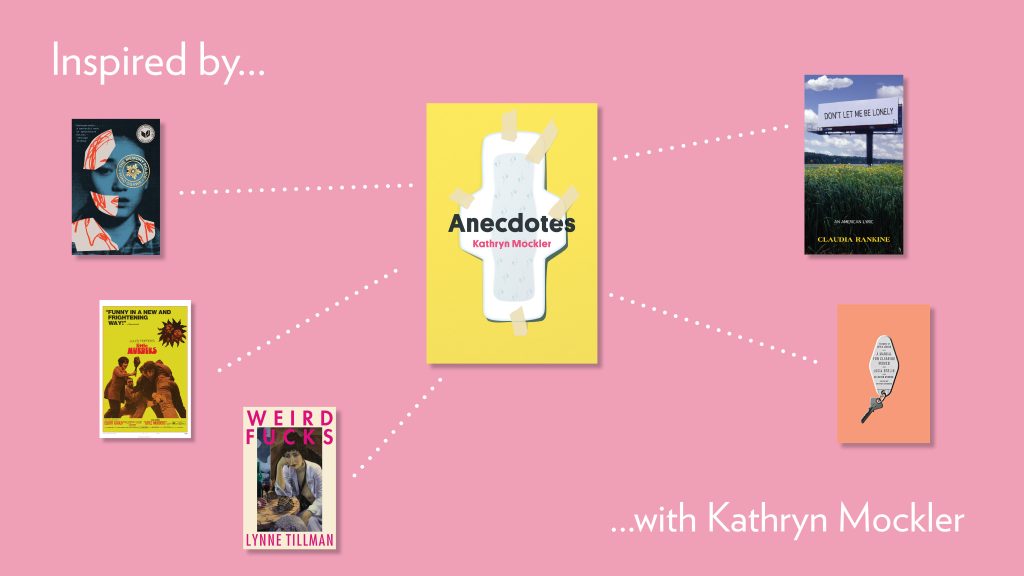Inspired By… with Kathryn Mockler

Today we’re excited to be sharing ten works that inspired Kathryn Mockler in writing Anecdotes!
These are ten works that I engaged with while writing my story collection Anecdotes. It is difficult to select just ten as there are many more, but these are some of the writers, musicians, filmmakers whose work I turned to most often or that stayed with me during the writing of my book.
—Kathryn Mockler
“Writing in a Dangerous Time” by Carrianne Leung
During the time I was writing Anecdotes, I started an online climate journal called Watch Your Head and co-edited a print anthology Watch Your Head: Writers and Artists Respond to the Climate Crisis, which was published by Coach House Books in 2020.
Carrianne Leung’s essay “Writing in a Dangerous Time” was published on the Watch Your Head site and was included in the print anthology. It is a beautiful essay that I return to often as it offers a guide for how to engage with creativity during catastrophe, how to cope with uncertainty, and how to find hope and even joy in your work and life.
“What If Birds Aren’t Singing They’re Screaming” from Party by Aldous Harding (2017)
Aldous Harding’s Party is one of the albums I listened to most while writing my book. The first time I heard “What If Birds Aren’t Singing They’re Screaming” it stopped me in my tracks. There’s something about this simple question that produces a sudden realization about perception and reality that is destabilizing and horrifying.
Weird Fucks by Lynne Tillman (1978)
Lynne Tillman’s 1978 novella Weird Fucks consists of short scenes, slices of life, and anecdotes of a young woman’s sexual adventures in the 1960s and 1970s—the good, the bad, and of course the very weird. Tillman’s style is understated and deadpan. The stories are often humorous and sometimes scary. Her writing gets the heart of each story quickly. This type of concision is something that influenced the second section of Anecdotes (We’re Not Here to Talk About Aliens).
A Manual for Cleaning Women: Selected Stories by Lucia Berlin (2015)
Manual for Cleaning Women, edited by Stephen Emerson with a foreword by Lydia Davis was published in 2015 (eleven years after Berlin’s death). Berlin’s autobiographical writing is blunt and honest and often depicts addiction, abuse, and trauma, hard truths, and complicated narratives about life, family, and love.
Don’t Let Me Be Lonely: An American Lyric by Claudia Rankine (2004)
In Don’t Let Me Be Lonely: An American Lyric (Graywolf Press), Claudia Rankine’s astute and raw observations, which are presented alongside photographs, illustrations, and video stills, cover a wide range of interconnected subjects—a family tragedy, death, depression, the films Boogie Nights and Magnolia, sleeplessness, health care, Derrida, the prison system, racism, 9/11 and more. This is a book I return to often for its gut-punch imagery, dry humour, hybridity, and biting social, cultural, and political analysis.
The Memory Police by Yōko Ogawa, translated by Stephen Snyder (1994)
Yōko Ogawa’s The Memory Police is a fable about an island whose inhabitants are forced into forgetting ordinary objects by the ruling “Memory Police”. The objects are confiscated and anyone who retains their memories of them are abducted. I’m deeply interested in the way destabilization and unreality are featured in this novel.
The Teeth of the Comb & Other Stories by Osama Alomar, translated by C.J. Collins (2017)
I first read Osama Alomar’s work in an excerpt The New Yorker published of his 2014 story collection Fullblood Arabian (translated by C.J. Collins) with an introduction by Lydia Davis. In these very short, sometimes one-line parables Alomar uses the nonsensical to point out and ridicule hypocrisy, abuse of power, greed, and corruption. These works are simultaneously hilarious and devastating.
365 Days/365 Plays by Suzan-Lori Parks (2006)
Dialogue plays a central role in much of my writing, and I often read playwrights for inspiration. I absolutely love the work of Suzan-Lori Parks, particularly 365 Days / 365 Plays, a project where Parks wrote a play every day for a year. These micro plays are funny, absurd, and unexpected. Parks describes the book as “a daily meditation, a daily prayer celebrating the rich and strange process of a writing life.” This book is a testament to what can happen when you show up for your work.
Drawing Together with Lynda Barry
If you are ever stuck on a creative project, I highly recommend Lynda Barry’s Drawing Together class. It helps you have fun and free up your mind. I turned to it many times during the writing of Anecdotes.
Little Murders with Elliot Gould, directed by Alan Arkin (1971)
Little Murders is a strange and absurd film about a romance between a pessimist and optimist that descends into madness and violence. I watched this film in 2021 and could not stop thinking about it while I was working on Anecdotes.
Kathryn Mockler is the author of five books of poetry. She co-edited the print anthology Watch Your Head: Writers and Artists Respond to the Climate Crisis (2020) and is the publisher of the Watch Your Head website. She runs Send My Love to Anyone, a literary newsletter, and is an Assistant Professor at the University of Victoria where she teaches screenwriting and fiction.

